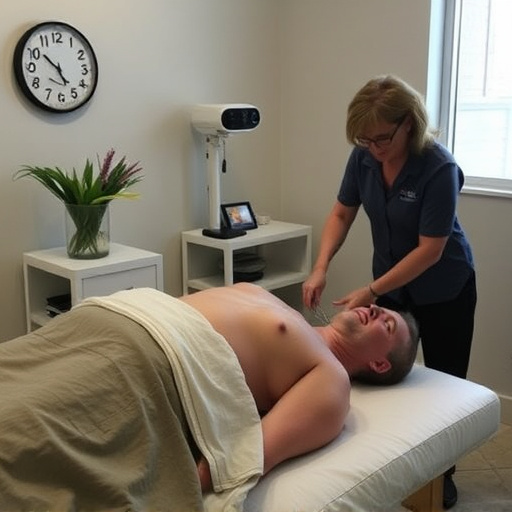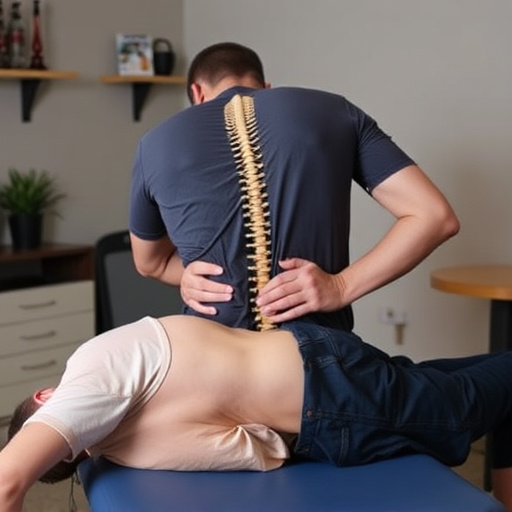Repetitive Strain Injury (RSI) is a common condition caused by repetitive tasks or poor posture, leading to muscle imbalances, joint pain, and nerve compression. Symptoms range from discomfort to reduced grip strength. Holistic management focuses on addressing root causes through ergonomic adjustments, physical therapy, mindfulness, stress reduction, and strengthening exercises for affected areas. This multi-faceted approach combines relaxation techniques, supportive work environments, and chiropractic care to alleviate symptoms, prevent recurrence, and improve overall well-being for RSI sufferers.
Repetitive Strain Injury (RSI) is a common yet often overlooked condition, affecting millions worldwide. This article delves into holistic options for managing RSI, offering a multi-faceted approach to treatment and prevention. From understanding the root causes and recognizing symptoms, to exploring lifestyle changes and ergonomic solutions, you’ll discover natural ways to alleviate pain and enhance overall well-being. Embrace a holistic perspective and reclaim control over your daily activities.
- Understanding Repetitive Strain Injury: Causes and Symptoms
- Holistic Approaches to Treatment and Prevention
- Lifestyle Changes and Ergonomic Solutions for RSI Relief
Understanding Repetitive Strain Injury: Causes and Symptoms

Repetitive Strain Injury (RSI) is a common condition affecting individuals across various professions and activities. It arises from repetitive tasks or sustained positions that place repeated stress on the muscles, tendons, and nerves. These can be as simple as typing on a computer for long hours or as physical as repetitive movements in construction work. The symptoms of RSI vary depending on the affected body part but often include pain, numbness, tingling, weakness, and decreased grip strength. Initial discomfort may gradually escalate if left unaddressed, potentially leading to long-term damage.
One of the primary causes is muscle imbalances resulting from poor posture or asymmetric workloads. For instance, those who spend most of their day hunched over a desk are at higher risk for developing RSI in the upper limbs. Auto accident recovery also plays a significant role, where individuals may experience prolonged discomfort and delayed onset RSI due to the trauma of an accident. Joint pain relief is another critical aspect of managing RSI, as it helps alleviate inflammation and promotes faster healing. Non-invasive treatment methods such as physical therapy, ergonomic adjustments, and lifestyle modifications are often recommended as initial steps towards effective RSI management.
Holistic Approaches to Treatment and Prevention

Holistic approaches to managing Repetitive Strain Injury (RSI) focus on addressing the root causes and promoting overall well-being rather than just treating symptoms. This involves a multi-faceted strategy that goes beyond traditional medical interventions. By incorporating therapeutic exercises tailored to strengthen and stretch specific muscle groups, individuals can gain better control over their symptoms and prevent recurrence.
In addition to physical therapy, other holistic practices such as mindfulness, stress management techniques, and ergonomic adjustments play a crucial role in chronic pain relief. For instance, reducing stress levels through relaxation methods can help alleviate tension in the body, thereby mitigating RSI symptoms. Similarly, ensuring a comfortable and supportive work environment with proper ergonomics can significantly contribute to back pain relief and overall prevention of repetitive strain injuries.
Lifestyle Changes and Ergonomic Solutions for RSI Relief

Making lifestyle changes and adopting ergonomic solutions can significantly alleviate symptoms of repetitive strain injury (RSI). One key aspect is to prioritize posture and practice good lifting techniques to reduce strain on muscles and joints, especially during daily activities like carrying groceries or using computers for extended periods. Regular breaks from repetitive tasks and taking short stretching breaks every 30 minutes can help prevent exacerbating symptoms.
Incorporating exercise focused on strengthening the upper body, hands, and wrists, as well as improving grip strength, can provide much-needed back pain relief while promoting overall wellness care. Additionally, exploring alternative treatments like spinal adjustments from a qualified chiropractor may offer additional support for RSI sufferers. These holistic approaches combine to create a comprehensive strategy for managing symptoms effectively and enhancing quality of life.
Repetitive strain injury (RSI) is a growing concern, but with a holistic approach, effective management and prevention are achievable. By combining understanding of RSI’s causes and symptoms with lifestyle changes, ergonomic solutions, and complementary treatments, individuals can find significant relief and restore their well-being. Integrating these holistic options into daily routines empowers folks to take control of their condition and avoid the cycle of pain and discomfort associated with RSI.














